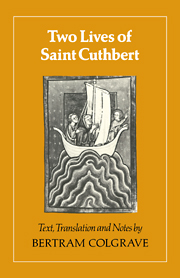Scriptural Quotations
Published online by Cambridge University Press: 04 November 2009
Summary
The Scriptural quotations in the Anonymous Life differ but little from the Vulgate. There are a few differences of word-order as in Mal. 1. 2, 3 (I, 3). One or two differences are probably due to loose quotation such as the quotation from Luke 10. 7 (II, 5), and from Romans 8. 32 (III, 7); the quotation from Romans 8. 30 (I, 3) in O1 reads “Quos ante predestinauit” though the ante for autem occurs only here and is possibly a scribal error, an easy confusion between aū and a. In the quotation from Matth. 6. 33 (II, 5) a text of the Celtic type has been used (see Novum Testamentum secundum editionem S. Hieronymi, ed. J. Wordsworth, etc., Oxford, 1889, etc.).
In Bede's Prose Life, however, the majority of the quotations do not conform to the text of the Vulgate. This may be partly due to Bede's habit of loose quotation and his way of fitting in the text to suit the syntax of his sentence, as for instance 1 Cor. 13. 11 (c. 1); Ps. 33. 18 (c. 3); Eph. 6. 16, 17 (c. 17); Ps. 113. i, 8 and ii, 1 (c. 18); and 1 Cor. 16. 13 (c. 27). But in a certain number of instances, it is clear that Bede has been using a text which is not the ordinary Vulgate text, but which, in the Old Testament, corresponds more or less with the reading given by Sabatier (Bibliorum Sacrorum Latinae Versiones Antiquae, ed. Pierre Sabatier, 3 vols., Paris, 1751) as the Itala or Versio Antiqua, or which in the New Testament can in several instances be identified from Wordsworth's edition (see above) as a text of the Celtic type.
- Type
- Chapter
- Information
- Two Lives of St. Cuthbert , pp. 56 - 58Publisher: Cambridge University PressPrint publication year: 1985



